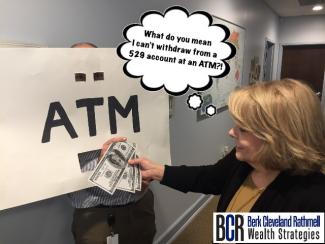
529 Withdrawal FAQs
You've done a great job of saving for your child's college education with a 529 plan. You’ve made contributions and kept an eye on the account’s growth over the years, and now you’re ready to start withdrawing funds. You have questions! Here are the answer to the questions most frequently asked by parents as they prepare to withdraw funds from the plan to pay tuition.
1. How much do I withdraw?
The amount of your child’s qualified education expenses for the year is the maximum you can draw out tax-free. If you qualify for the American Opportunity Tax Credit, which is $4,000, that amount will be deducted from the amount you can withdraw. If you don’t qualify for that deduction, then you can take the full amount of your qualified education expenses.
2. When do I withdraw the money?
You must take withdrawals in the same calendar year the qualified expenses are paid. Toward the end of the year, it’s important to add up your bills and do a catch-up withdrawal if your expenses are greater than the total you’ve withdrawn.
3. Who receives the distribution?
Checks can be made out to the account owner, the beneficiary, or the beneficiary and the college jointly.
4. How do scholarships work with 529 withdrawals?
You must pay taxes and a 10% penalty on non-qualified distributions. If you wind up with an excess distribution due to your child receiving a scholarship, you must still pay taxes on the excess amount, but the penalty is waived.
5. What if there's still money in the account after my child graduates?
If you have money left over after graduation, you can hold on to it in case your child decides to go to graduate school. You can also transfer it to another close relative of the original beneficiary or use it yourself for qualified education expenses, like taking a foreign language or gardening class at a community college or any other school that's eligible to receive 529 funds.
If you decide to transfer the account to another relative, you will have to pay taxes if you skip a generation. If you make a grandchild the beneficiary, you can avoid taxes by paying tuition directly to the school; however, in this case, the tax exemption applies to tuition only. Books, room and board, and other qualified expenses will be taxable.
Take the same care with the distribution of your 529 plans that you used to save and grow the resources that help prepare your child for the next phase of life.

